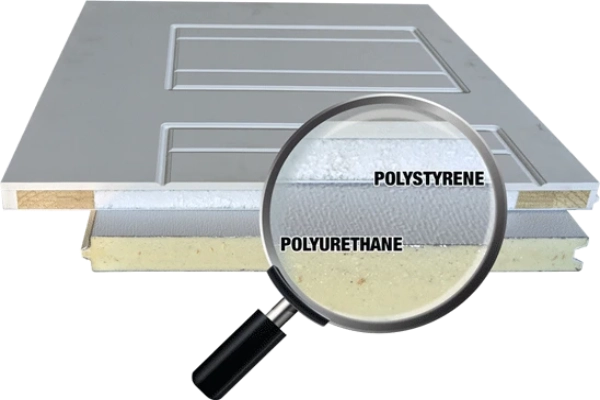Do I need garage door insulation?
Garage door insulation will impact your garage door in 3 ways:
- Increase energy efficiency
- Increase durability
- Reduce noise
You should consider insulating your garage door if your garage is attached to your home or the garage door is part of the facade of your home. Generally speaking, the overall quality of the construction of the garage door is determined by the type of insulation you choose.
Garage door manufacturer's offer 3 basic types of garage door construction. Think of them as 1-layer, 2-layer, and 3-layer:
- The 1-layer door will have no insulation and is just a single layer of steel.
- The 2-layer door will have a layer of steel with insulation behind it backed by a layer of vinyl to keep the insulation in place.
- The 3 layer door will have 2 layers of steel with insulation sealed in between in a sandwich type of construction. This is the highest quality and will typically cost more money.
There are 2 types of insulation: Polystyrene and Polyurethane

Polyurethane is the higher quality insulation
Polystyrene is similar to the material in a styrofoam cooler. Polyurethane fills the entire panel and makes the garage door panel feel really solid. Today’s manufacturer’s often use Polystyrene in 2-layer construction and polyurethane in 3-layer construction.
If there is no insulation and a only a single layer, the door will tend to rattle when it is operating and will be prone to denting and rusting. If the door is struck with an object it will produce a loud sound. A door with 3-layer construction will produce a much quieter sound when struck with an object. It will sound more like a dull thud. It is also quieter when in operation. Insulation makes the door resistant to denting and rusting. This is another reason insulation is desirable when the door is part of your home's facade.
Every garage door with insulation has an R-Value. The way this works is essentially the higher the number the better. R-Value is a measure of the door’s thermal resistance. Typically garage doors will range from an R-8 at the low end to R-32 at the very high end. Most commonly people purchase doors with an R-Value of around 16. Pretty close to their home’s R-Value.
An insulated garage door will not make your garage door warm but it will make it warmer. And that’s the point. It may raise the temperature by as much as 10 degrees and that is very often the difference between cold and freezing which is important.
When you purchase a garage door, it is likely to be worth spending the additional money on quality construction when the door is visible from the front of your home or attached to your home. If the garage door is hidden from view and is not attached to your home you may be less concerned with how it will look over the long term. In this case, you might consider saving some money and purchasing a less expensive door.